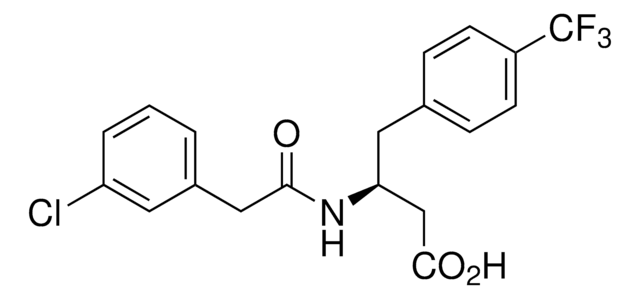371725
GPR43 (FFA2) Agonist
The GPR43 (FFA2) Agonist controls the biological activity of GPR43. This small molecule/inhibitor is primarily used for Biochemicals applications.
Sinónimos:
GPR43 (FFA2) Agonist, (S)-2-(4-chlorophenyl)-3,3-dimethyl-N-(5-phenylthiazol-2-yl)butanamide
Iniciar sesiónpara Ver la Fijación de precios por contrato y de la organización
About This Item
Fórmula empírica (notación de Hill):
C21H21ClN2OS
Número de CAS:
Peso molecular:
384.92
UNSPSC Code:
51111800
NACRES:
NA.77
Productos recomendados
Quality Level
assay
>98% (HPLC)
form
solid
manufacturer/tradename
Calbiochem®
storage condition
OK to freeze
color
white
solubility
DMSO: 50 mg/mL
shipped in
ambient
storage temp.
2-8°C
General description
A phenylacetamide compound that acts as an allosteric agonist of FFA2 (GPR43), demonstrating a left-shifted acetate dose response (IC50 = 0.7 µM) and 111% efficacy relative to acetate in hFFA2 forskolin-induced cAMP assays.
Warning
Toxicity: Standard Handling (A)
Reconstitution
Following reconstitution, aliquot and freeze (-20°C). Stock solutions are stable for up to 3 months at -20°C.
Other Notes
Wang, Y., et al. 2009. Bioorg. Med. Chem. Lett.20, 493.
Legal Information
CALBIOCHEM is a registered trademark of Merck KGaA, Darmstadt, Germany
Storage Class
11 - Combustible Solids
wgk_germany
WGK 3
flash_point_f
Not applicable
flash_point_c
Not applicable
Certificados de análisis (COA)
Busque Certificados de análisis (COA) introduciendo el número de lote del producto. Los números de lote se encuentran en la etiqueta del producto después de las palabras «Lot» o «Batch»
¿Ya tiene este producto?
Encuentre la documentación para los productos que ha comprado recientemente en la Biblioteca de documentos.
Sandra M Holmberg et al.
Nature communications, 15(1), 3502-3502 (2024-04-26)
Beneficial gut bacteria are indispensable for developing colonic mucus and fully establishing its protective function against intestinal microorganisms. Low-fiber diet consumption alters the gut bacterial configuration and disturbs this microbe-mucus interaction, but the specific bacteria and microbial metabolites responsible for
Signe Schultz Pedersen et al.
The FEBS journal, 291(3), 566-583 (2023-11-21)
Butyrate, a gut microbial metabolite, has beneficial effects on glucose homeostasis and has become an attractive drug candidate for type 2 diabetes (T2D). Recently, we showed that butyrate protects pancreatic beta cells against cytokine-induced dysfunction. In this study, we explored
Anne Ørgaard et al.
Islets, 11(5), 103-111 (2019-08-31)
The intestinal microbiota has been demonstrated to influence host metabolism, and has been proposed to affect the development of obesity and type 2 diabetes (T2D), possibly through short-chain fatty acids (SCFAs) produced by fermentation of dietary fiber. There are some
Bandik Föh et al.
PloS one, 17(3), e0266071-e0266071 (2022-03-26)
The microbially-derived short-chain fatty acid butyrate is a central inhibitor of inflammatory innate and adaptive immune responses. Emerging evidence suggests that butyrate induces differentiation of IL-10-producing (IL-10+) regulatory B cells. However, the underlying mechanisms of butyrate-driven modulation of B cell
José Luís Fachi et al.
The Journal of experimental medicine, 217(3) (2019-12-27)
Antibiotic-induced dysbiosis is a key predisposing factor for Clostridium difficile infections (CDIs), which cause intestinal disease ranging from mild diarrhea to pseudomembranous colitis. Here, we examined the impact of a microbiota-derived metabolite, short-chain fatty acid acetate, on an acute mouse
Nuestro equipo de científicos tiene experiencia en todas las áreas de investigación: Ciencias de la vida, Ciencia de los materiales, Síntesis química, Cromatografía, Analítica y muchas otras.
Póngase en contacto con el Servicio técnico


![Poly[(R)-3-hydroxybutyric acid] natural origin](/deepweb/assets/sigmaaldrich/product/structures/129/476/7d1c924b-f644-4889-a2d6-d7a923ce382c/640/7d1c924b-f644-4889-a2d6-d7a923ce382c.png)



